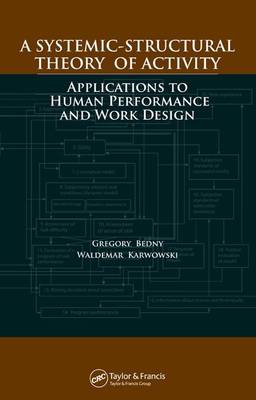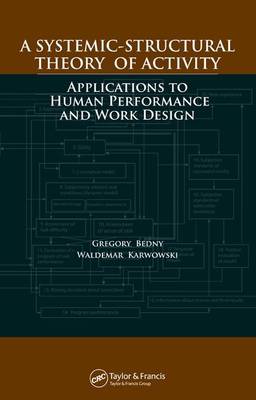
- Afhalen na 1 uur in een winkel met voorraad
- Gratis thuislevering in België vanaf € 30
- Ruim aanbod met 7 miljoen producten
- Afhalen na 1 uur in een winkel met voorraad
- Gratis thuislevering in België vanaf € 30
- Ruim aanbod met 7 miljoen producten
A Systemic-Structural Theory of Activity
Applications to Human Performance and Work Design
Gregory Bedny, Waldemar KarwowskiOmschrijving
The last several decades have demonstrated dramatic technological changes that influence work conditions in all applied domains, including manufacturing, transportation, and human-computer interactions. These changes require new approaches to the study of human performance. Activity theory, in particular has become increasingly popular with those who study human work dynamics.
A Systemic-Structural Theory of Activity: Applications to Human Performance and Work Design discusses general activity theory (AT) and introduces systematic structural activity theory (SSAT) and its applications to the study of human work.
The book contains multiple practical examples of systemic-structural theory of activity analyses, including a study of production operations in the manufacturing environment, system safety evaluation, work improvement, equipment design, and robot system performance. It also provides examples of the design of human/computer interaction tasks, training, efficiency, work motivation, fatigue, personality, and individual style of performance.
This book addresses the wide audience of psychologists working in fields such as Industrial/Organizational Psychology, Experimental, and Cognitive Psychology. It can also be of use to computer science specialists and other professionals who study human work activity and education.
Specificaties
Betrokkenen
- Auteur(s):
- Uitgeverij:
Inhoud
- Aantal bladzijden:
- 526
- Taal:
- Engels
Eigenschappen
- Productcode (EAN):
- 9780849397646
- Verschijningsdatum:
- 27/07/2006
- Uitvoering:
- Hardcover
- Formaat:
- Ongenaaid / garenloos gebonden
- Afmetingen:
- 161 mm x 236 mm
- Gewicht:
- 884 g

Alleen bij Standaard Boekhandel
Beoordelingen
We publiceren alleen reviews die voldoen aan de voorwaarden voor reviews. Bekijk onze voorwaarden voor reviews.











